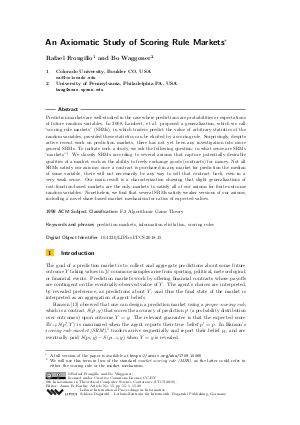An Axiomatic Study of Scoring Rule Markets
Authors Rafael Frongillo, Bo Waggoner
-
Part of:
Volume:
9th Innovations in Theoretical Computer Science Conference (ITCS 2018)
Part of: Series: Leibniz International Proceedings in Informatics (LIPIcs)
Part of: Conference: Innovations in Theoretical Computer Science Conference (ITCS) - License:
 Creative Commons Attribution 3.0 Unported license
Creative Commons Attribution 3.0 Unported license
- Publication Date: 2018-01-12
File

PDF
LIPIcs.ITCS.2018.15.pdf
- Filesize: 0.8 MB
- 20 pages
Document Identifiers
Subject Classification
Keywords
- prediction markets
- information elicitation
- scoring rules
Metrics
- Access Statistics
-
Total Accesses (updated on a weekly basis)
0Document
0Metadata
Abstract
Prediction markets are well-studied in the case where predictions are probabilities or expectations of future random variables. In 2008, Lambert, et al. proposed a generalization, which we call "scoring rule markets" (SRMs), in which traders predict the value of arbitrary statistics of the random variables, provided these statistics can be elicited by a scoring rule. Surprisingly, despite active recent work on prediction markets, there has not yet been any investigation into more general SRMs. To initiate such a study, we ask the following question: in what sense are SRMs "markets"? We classify SRMs according to several axioms that capture potentially desirable qualities of a market, such as the ability to freely exchange goods (contracts) for money. Not all SRMs satisfy our axioms: once a contract is purchased in any market for prediction the median of some variable, there will not necessarily be any way to sell that contract back, even in a very weak sense. Our main result is a characterization showing that slight generalizations of cost-function-based markets are the only markets to satisfy all of our axioms for finite-outcome random variables. Nonetheless, we find that several SRMs satisfy weaker versions of our axioms, including a novel share-based market mechanism for ratios of expected values.
Cite As Get BibTex
Rafael Frongillo and Bo Waggoner. An Axiomatic Study of Scoring Rule Markets. In 9th Innovations in Theoretical Computer Science Conference (ITCS 2018). Leibniz International Proceedings in Informatics (LIPIcs), Volume 94, pp. 15:1-15:20, Schloss Dagstuhl – Leibniz-Zentrum für Informatik (2018)
https://doi.org/10.4230/LIPIcs.ITCS.2018.15
BibTex
@InProceedings{frongillo_et_al:LIPIcs.ITCS.2018.15,
author = {Frongillo, Rafael and Waggoner, Bo},
title = {{An Axiomatic Study of Scoring Rule Markets}},
booktitle = {9th Innovations in Theoretical Computer Science Conference (ITCS 2018)},
pages = {15:1--15:20},
series = {Leibniz International Proceedings in Informatics (LIPIcs)},
ISBN = {978-3-95977-060-6},
ISSN = {1868-8969},
year = {2018},
volume = {94},
editor = {Karlin, Anna R.},
publisher = {Schloss Dagstuhl -- Leibniz-Zentrum f{\"u}r Informatik},
address = {Dagstuhl, Germany},
URL = {https://drops.dagstuhl.de/entities/document/10.4230/LIPIcs.ITCS.2018.15},
URN = {urn:nbn:de:0030-drops-83611},
doi = {10.4230/LIPIcs.ITCS.2018.15},
annote = {Keywords: prediction markets, information elicitation, scoring rules}
}
Author Details
References
- J. Abernethy and R. Frongillo. A characterization of scoring rules for linear properties. In Proceedings of the 25th Conference on Learning Theory, pages 1-27, 2012. URL: http://jmlr.csail.mit.edu/proceedings/papers/v23/abernethy12/abernethy12.pdf.
-
Jacob Abernethy, Yiling Chen, and Jennifer Wortman Vaughan. Efficient market making via convex optimization, and a connection to online learning. ACM Transactions on Economics and Computation, 1(2):12, 2013.

-
Jacob Abernethy, Sindhu Kutty, Sébastien Lahaie, and Rahul Sami. Information aggregation in exponential family markets. In Proceedings of the fifteenth ACM conference on Economics and computation, pages 395-412. ACM, 2014.

-
Jacob D. Abernethy and Rafael M. Frongillo. A collaborative mechanism for crowdsourcing prediction problems. In Advances in Neural Information Processing Systems 24, pages 2600-2608, 2011.

- Jacob D. Abernethy, Rafael M. Frongillo, Xiaolong Li, and Jennifer Wortman Vaughan. A general volume-parameterized market making framework. In Moshe Babaioff, Vincent Conitzer, and David Easley, editors, ACM Conference on Economics and Computation, EC '14, Stanford , CA, USA, June 8-12, 2014, pages 413-430. ACM, 2014. URL: http://dx.doi.org/10.1145/2600057.2602900.
- Arpit Agarwal and Shivani Agarwal. On consistent surrogate risk minimization and property elicitation. In JMLR Workshop and Conference Proceedings, volume 40, pages 1-19, 2015. URL: http://www.jmlr.org/proceedings/papers/v40/Agarwal15.pdf.
-
G.W. Brier. Verification of forecasts expressed in terms of probability. Monthly weather review, 78(1):1-3, 1950.

-
Y. Chen and D.M. Pennock. A utility framework for bounded-loss market makers. In Proceedings of the 23rd Conference on Uncertainty in Artificial Intelligence, pages 49-56, 2007.

-
Rafael Frongillo and Ian Kash. General truthfulness characterizations via convex analysis. In Web and Internet Economics, pages 354-370. Springer, 2014.

-
Rafael Frongillo and Ian Kash. Vector-Valued Property Elicitation. In Proceedings of the 28th Conference on Learning Theory, pages 1-18, 2015.

-
T. Gneiting. Making and Evaluating Point Forecasts. Journal of the American Statistical Association, 106(494):746-762, 2011.

-
Tilmann Gneiting and Adrian E. Raftery. Strictly proper scoring rules, prediction, and estimation. Journal of the American Statistical Association, 102(477):359-378, 2007.

-
R. Hanson. Combinatorial Information Market Design. Information Systems Frontiers, 5(1):107-119, 2003.

-
Nicolas S. Lambert, David M. Pennock, and Yoav Shoham. Eliciting properties of probability distributions. In Proceedings of the 9th ACM Conference on Electronic Commerce, pages 129-138, 2008.

-
Nicolas S. Lambert and Yoav Shoham. Eliciting truthful answers to multiple-choice questions. In Proceedings of the 10th ACM conference on Electronic commerce, pages 109-118, 2009.

-
R.T. Rockafellar. Convex analysis, volume 28 of Princeton Mathematics Series. Princeton University Press, 1997.

-
L.J. Savage. Elicitation of personal probabilities and expectations. Journal of the American Statistical Association, pages 783-801, 1971.

-
Jean-Baptiste Hiriart Urruty and Claude Lemaréchal. Fundamentals of Convex Analysis. Springer, 2001.

-
J. Wolfers and E. Zitzewitz. Prediction Markets. Journal of Economic Perspective, 18(2):107-126, 2004.

